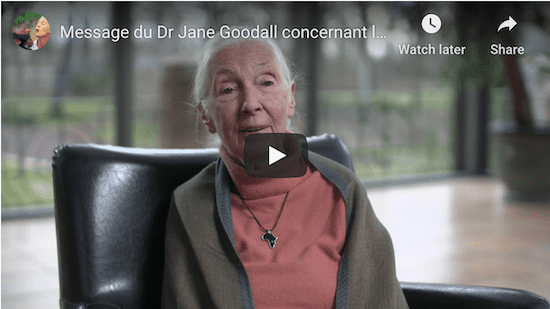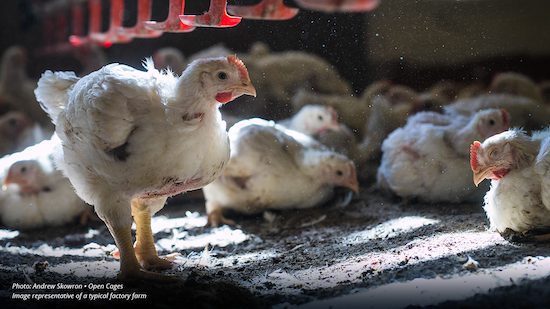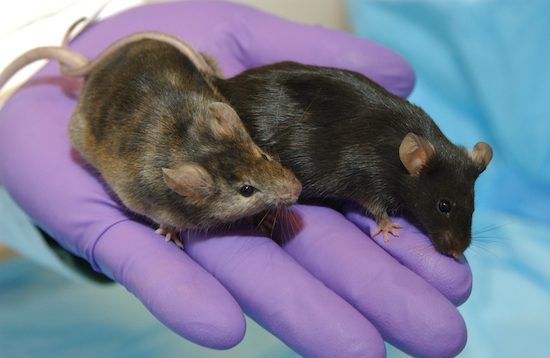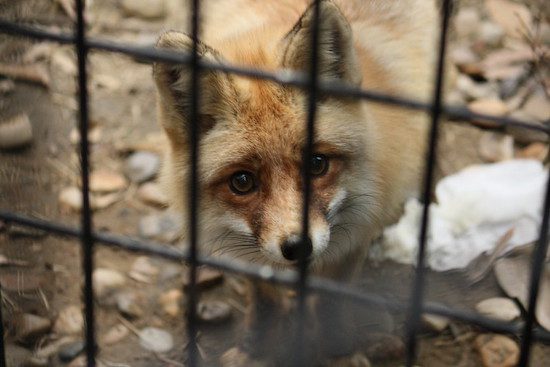


“My heart is with all who are sick, all who have lost loved ones. I just hope and pray that the nightmare will soon be over. I also hope and pray that the nightmare may end for the wild animals who are captured and kept in horrible conditions for food, all because some people believe that various animal parts can be used to cure diseases or give people strength or virility. Because animals—bears, pangolins, civets, bats, rhinos and so on—they all have feelings just like us, they suffer pain like us. They know fear, loneliness and despair. All over the world we’ve been destroying the places where animals live in order to get materials to build our homes, our cities, and to make our own lives more comfortable. And as a result, we’ve brought the climate crisis on ourselves. Many species of animals and plants have become extinct. And our too-close relationship with wild animals in the markets, or when we use them for entertainment, has unleashed the terror and misery of new viruses.” —Jane Goodall, March 16, 2020
Change: There are more than 7.75 billion humans on Earth. And two-thirds of all animal species are being wiped out. 100,000 elephants were killed in the last three years. Too many species with once robust populations have now been reduced to a few thousand, a few hundred or even less. Humans are rapidly destroying the natural world in a blood-soaked pursuit of greed, false power, ego, ignorance and stupidity. We are witnessing the Sixth Extinction: Tigers, elephants, bears, rhinoceros, wolves, leopards, jaguars, cheetahs, gorillas, orangutans, so many bird species and sea life are on the brink of total annihilation, and in a few years may be gone forever—unless mankind takes drastic measures immediately.
>>>Urge Secretary General of the United Nations António Guterres to take steps toward a ban on international travel for trophy hunting and importing/exporting animal parts.
Citizens for Alternatives to Animal Research and Experimentation: For the estimated 300 million people around the world suffering from depression, there is a need for safe, effective therapies. Sadly, vast resources go toward using animals to study depression, a macabre and unscientific pursuit in the guise of medical research. A notorious example is the “forced swim test,” in which researchers drop mice and rats into inescapable tanks of water and watch as they struggle to stay afloat. The animals, who no doubt experience tremendous fear and distress, are said to be depressed if they “give up” and stop swimming sooner than others. This assumption is unfounded, as there are countless reasons why a mouse or rat might stop swimming. Shockingly, this has gone on for decades, even though many scientists and doctors have admitted the test is without merit. There are new and emerging methods for studying the causes and treatments of depression that are far superior to flawed animal experiments. For example, a recent study by researchers at Johns Hopkins University used “mini-brains” to demonstrate that a common antidepressant drug may actually damage developing neurons in the fetus.
>>>Urge the National Institute of Mental Health to call for an end to funding studies using the forced swim test.
In Defense of Animals: As herds of camels roamed into rural communities in Australia’s arid central Anangu Pitjantjatjara Yankunytjatjara region in a desperate search for water amidst drought, extreme heat and the deadly bushfires that have claimed the lives of more than one billion animals, the Australian government yet again initiated and tried to justify its inhumane plan to shoot thousands of camels by using the ridiculous excuse that camels are drinking too much water. In January, more than 5,000 terrified camels were needlessly and horrifically gunned down, with many left to suffer for hours or even days after being wounded before dying. Mass camel executions have been done many times over the years in regions throughout Australia with the end result always being unsatisfactory. Expensive and ineffective, these cruel culls fail to address the real cause of water shortages: livestock, which consume nearly half of the country’s agricultural water supply. The nation’s long-term, sustainable solution to water conservation requires a reduction in livestock agriculture and a move to plant-based diets, which will save enough water to hydrate the entire continent—including unfairly vilified camels.
>>>Urge the Executive Board Members of Anangu Pitjantjatjara Yankunytjatjara and the South Australian government to permanently end to camel culls and address the real cause of water shortages: animal agriculture.
Letter to the editor…

Replying to “Corporate ‘Cage-Free’ Commitments Are Only Meaningful With Accountability,” by David-Coman Hidy:
I have eight laying hens who live in the Ritz Carlton of coops in my backyard. They have a door to their own space outside (protected from hawks with a chicken wire roof) to scratch and sun. Although I live in a subdivision, after 17 years here, my property and all the things in it are organic. I sell my eggs to neighbors for $5 a dozen. The eggs are pink, blue, green, tan and brown, and one of the hens every now and then lays a huge double-yolked egg, which I eat, myself! Just saying… —Geri Taran (Lawrenceville, Georgia)
Cause for concern…

“Climate change is the defining challenge of our time. Time is fast running out for us to avert the worst impacts of climate disruption and protect our societies from the inevitable impacts to come,” said U.N. Secretary-General Antonio Guterres, in his foreword to the World Meteorological Organization’s recently released annual Statement on the State of the Global Climate. “We need more ambition on mitigation, adaptation and finance in time for the climate conference (COP26) to be held in Glasgow in November. That is the only way to ensure a safer, more prosperous and sustainable future for all people on a healthy planet.” During the COP24 climate conference in 2018, Guterres warned that failing to agree on climate action would “not only be immoral” but “suicidal.”
- Planet’s largest ecosystems collapse faster than previously forecast (University of Southampton)
- Coronavirus: Bangkok’s illegal ‘wet markets’ still selling live animals despite ban over fears of new epidemics (Liz Little, The Sun)
- Coronavirus outbreak ‘could set back’ climate change efforts (Liam Gilliver, Plant Based News)
- Sea otters, opossums and the surprising ways pathogens move from land to sea (University of California – Davis, ScienceDaily)
- Environmentalists concerned that biodiversity conservation plans lack urgency (Gemma Bowcock, META)
- Trump’s polluted policies leave children in bad air (Derrick Z. Jackson, Environmental Health News)
- Ash and debris are choking Australia’s rivers in the wake of bushfires (Adam Welz, Yale Environment 360)
- Animal rights group reveal millions of cats and dogs getting butchered illegally in Asia (Jan Cortes, Medical Daily)
Round of applause…

“Mice are naturally resistant to coronavirus, so scientists are scrambling to genetically alter them to be susceptible, although their infection will not resemble the human illness,” writes Barbara Stagno, president of Citizens for Alternatives to Animal Research and Experimentation. “A recent study examined non-animal models for developing vaccines for certain viruses and determined that ground-breaking human-mimetic approaches, such as induced pluripotent stem cell models, organoids and in silico mathematical modeling, are more likely to result in a successful vaccine than experiments on mice and monkeys.”
- Fighting COVID-19 without animal tests (Barbara Stagno, Citizens for Alternatives to Animal Research and Experimentation)
- Virus outbreak is yet another argument against trapping (Kristina Snyder, Concord Monitor)
- Vegan pop-up to serve free food to those struggling amid coronavirus crisis (Liam Gilliver, Plant Based News)
- Order these 11 items online to support small vegan businesses during the coronavirus pandemic (VegOut Media)
- Stockpile empathy: Vegan food guide to get you through self-isolation (PETA UK)
- Vegan Fashion Week to livestream event during coronavirus pandemic (VegOut Media)
- As COVID-19 spreads, activists rally to shut down 85 live animal markets and slaughterhouses in NYC (Donny Moss, Their Turn)
- Amid coronavirus crisis, Alec Baldwin praises NYC Mayor de Blasio and condemns horse carriage drivers (Shant Shahrigian, Daily News)
- Chinese are gradually switching to vegetarian and vegan foods (Vegan First Guide)
- Need to get outside? These national parks offer virtual tours you can take from the comfort of home (Andrea Romano, Travel + Leisure)
- Boost your immune system during the coronavirus outbreak with these 7 vegan nutrition tips (Charlotte Pointing, LIVEKINDLY)
Parting thought…

“A just transition will require working through ‘systems of separation,’ more commonly known as ‘systems of oppression,’ which is another way of saying systems of domination, hierarchy, or superiority. Based on myths and lies, these systems purport that one group is more normal, superior, and/or powerful, and empower it to dominate another set of living beings. For example, patriarchy, class or caste hierarchies, and human domination over animals are all systems of oppression.” —Kritee (“Why Bodhisattvas Need to Disrupt the Status Quo,” Lion’s Roar)
Earth | Food | Life (EFL) explores the critical and often interconnected issues facing the climate/environment, food/agriculture and nature/animal rights, and champions action; specifically, how responsible citizens, voters and consumers can help put society on an ethical path of sustainability that respects the rights of all species who call this planet home. EFL emphasizes the idea that everything is connected, so every decision matters.
Click here to support the work of EFL and the Independent Media Institute.
Questions, comments, suggestions, submissions? Contact EFL editor Reynard Loki at [email protected]. Follow EFL on Twitter @EarthFoodLife.